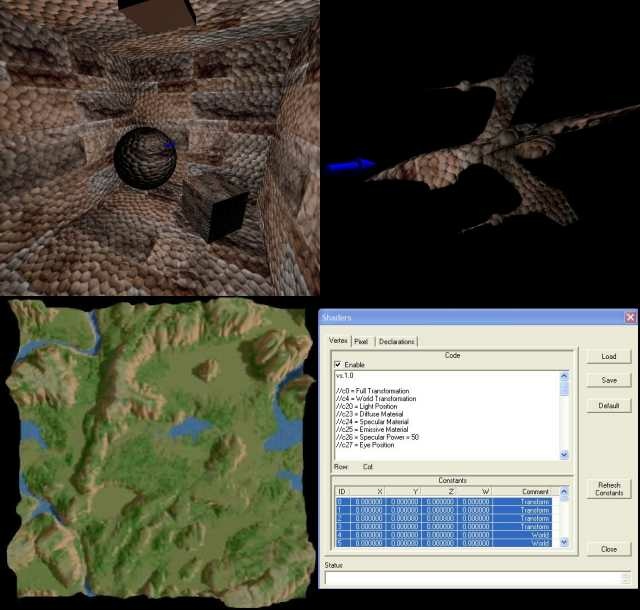 |

Submitted by , posted on 21 January 2002
|
 |

Image Description, by

Greeting fellow flipcoders. Over the years I have seen many posts on Games,
Landscapes, Effects, and Engines of all sorts. Well this time I decided to post
something that would bring them all together and is hopefully usefull for future
posts.
I am presented a set of pictures from my program called Shader Studio. It is a
utility for Direct3D 8.1 developers to design and develop Vertex and Pixel
Shaders. Currently I have just opened up beta testing and welcome any who dable
in advanced graphics to participate. Of course you will need the best video
cards to get the real features. A GF3 for Version 1.0 Pixel Shaders or a Radeon
8500 for everything.
Well to continue on with the posting, let me explain the pictures. In the upper
left is a picture of the standard cornell box with my technique of bump mapping.
I use an alignment of the textures to determine the mapping from light to
texture space, this way I can completely do the math in the vertex shader and
allow for any geometry so long as it has the proper texture coordinates. Then
the Pixel Shader processes the bump mapping using a simple dot3 combine of the
base texture with the bump map.
The next picture in the upper right is the same bump mapping Vertex Shader put
onto one of the DirectX spaceship models. The only difference is the subtle
attenuation of the light, done in the pixel shader.
The lower right picture shows the shader development interface, this is only one
of many controls to manage shader development, but it is the most important.
And last, but not least, is the best one. You will see what looks like an
ordinary landscape, but be fooled for this is actually the first implementation
of Real-Time Per Pixel Displacement mapping I know of. Yes, 1 polygon, 2
triangles, many FPS. Though it's in a higly experimental state, I just had to
post a pic. It currently has many limitations, one is that it will only run on a
Radeon 8500, next is it breaks down at sleep angles, but the effect is very
real.
For further information and to participate in the beta please see
http://www.shaderstudio.com
|
|

